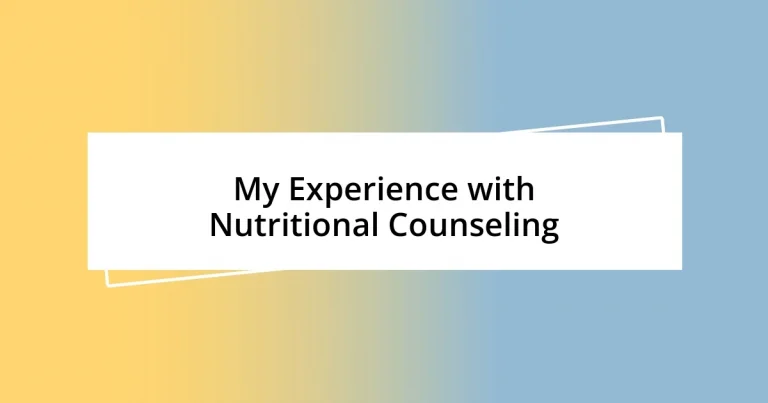Key takeaways:
- Nutritional counseling empowers individuals to understand the emotional and psychological factors behind their eating habits, fostering a healthier relationship with food.
- Personalized goal setting and accountability from a nutritionist help individuals maintain motivation and celebrate small victories in their health journey.
- Overcoming challenges, such as cravings and social situations, can lead to self-awareness and healthier lifestyle choices that enhance overall well-being.
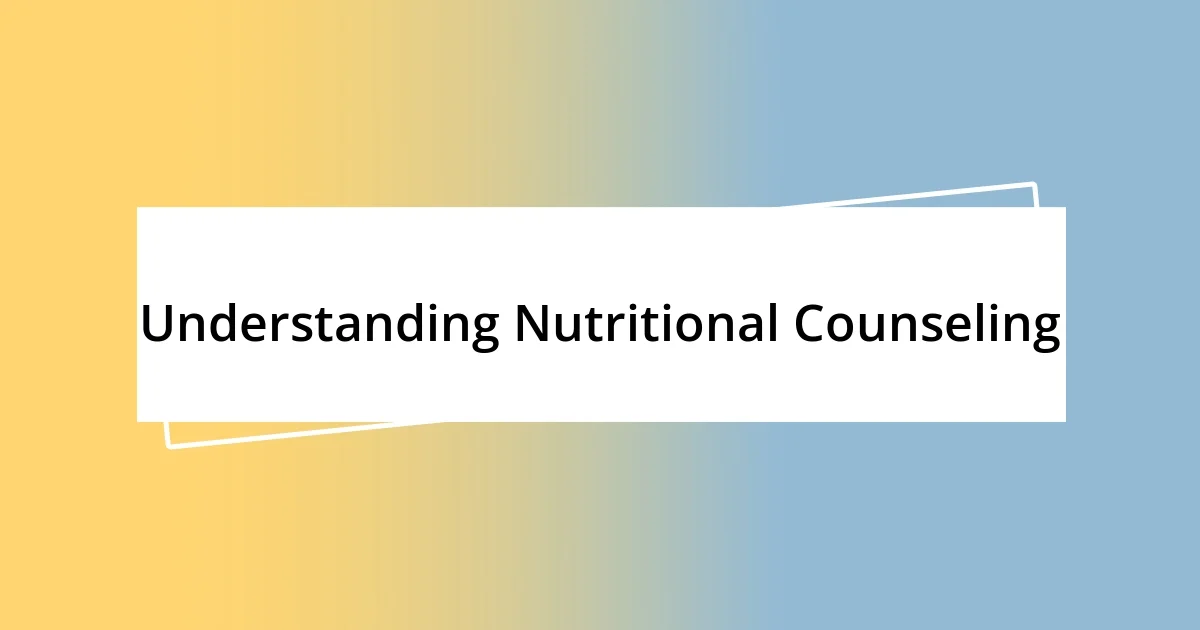
Understanding Nutritional Counseling
Nutritional counseling is much more than just meal planning; it’s about understanding how food impacts our emotions, energy levels, and overall well-being. I remember sitting across from my counselor, feeling a mix of hope and skepticism. When she explained how certain foods could elevate my mood or reduce fatigue, it clicked for me. Isn’t it fascinating how our diet can play such a pivotal role in our mental state?
As I navigated through personalized dietary advice, I discovered that nutritional counseling is also an empowering journey. Have you ever felt overwhelmed by diet trends or conflicting information? I certainly have. My counselor helped me sift through the noise, focusing on what my body truly needed rather than what the latest fad claimed. This tailored approach nurtured my self-awareness and ultimately changed my relationship with food.
The emotional support I received during this process was invaluable. I found myself opening up about my struggles with emotional eating, and it was freeing to discuss these challenges in a safe space. Have you ever shared such personal experiences? That vulnerability led to real growth; it’s clear to me now that understanding the ‘why’ behind our eating habits is just as essential as the ‘what.’
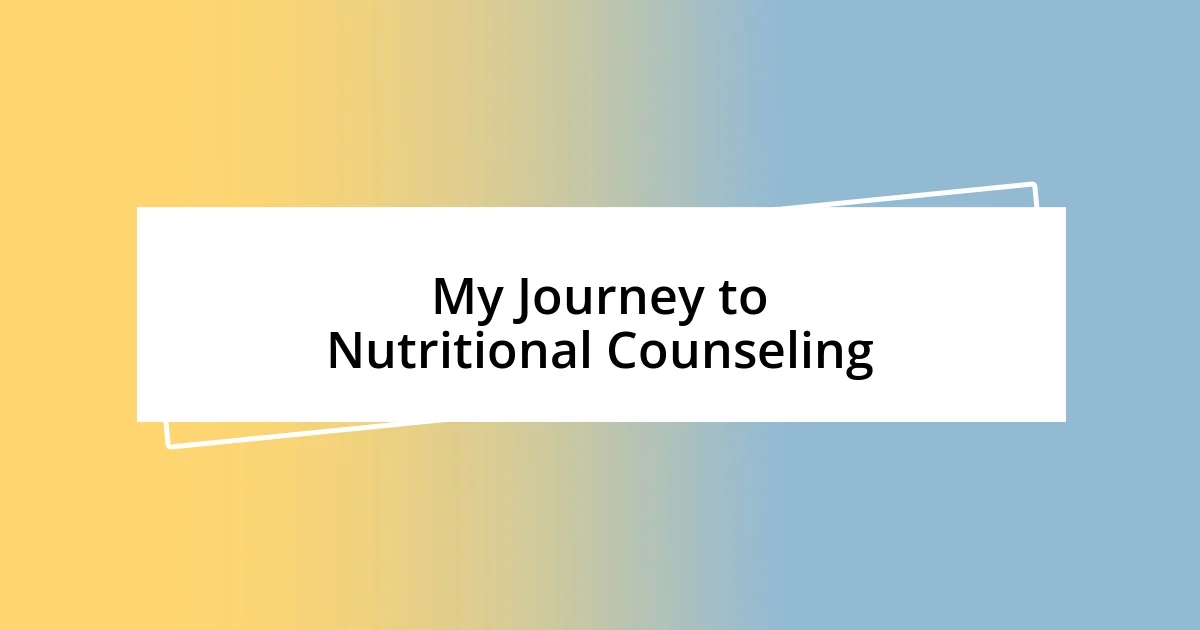
My Journey to Nutritional Counseling
My journey into nutritional counseling began when I hit a wall with my eating habits. At the time, I felt sluggish and constantly battled cravings I couldn’t understand. When I first stepped into my counselor’s office, I was a bundle of nerves. I distinctly remember spilling out my most frustrating moments—like when I would binge-eat during stressful days. It was such a relief to know I wasn’t alone; my counselor’s empathetic listening made all the difference.
Over time, I came to recognize that it wasn’t just about what I was eating, but why I turned to certain foods in emotional moments. I shared a vivid memory of a particularly tough week when I’d reached for ice cream instead of addressing my stress. The realization that I could find healthier coping mechanisms was liberating. Have you ever felt that shift when you finally connect the dots between your feelings and your food choices? It’s a lightbulb moment that felt transformative for me.
As I progressed, I learned to celebrate small victories. I found joy in meal prepping for the week, something I dreaded before. I remember the pride I felt when I prepared a balanced lunch that not only nourished me but also excited my taste buds. What about you? Isn’t it empowering to take control of our health journey? Embracing this process opened my eyes, allowing me to appreciate food as fuel—not just a source of comfort or escape.
| Past Experience | Nutritional Counseling Insights |
|---|---|
| Struggled with emotional eating | Learned to identify triggers behind cravings |
| Felt stuck with diet fads | Received personalized guidance tailored to my needs |
| High stress often led to poor food choices | Discovered healthier coping mechanisms |
| Ignored my body’s needs | Gained awareness of what my body truly requires |
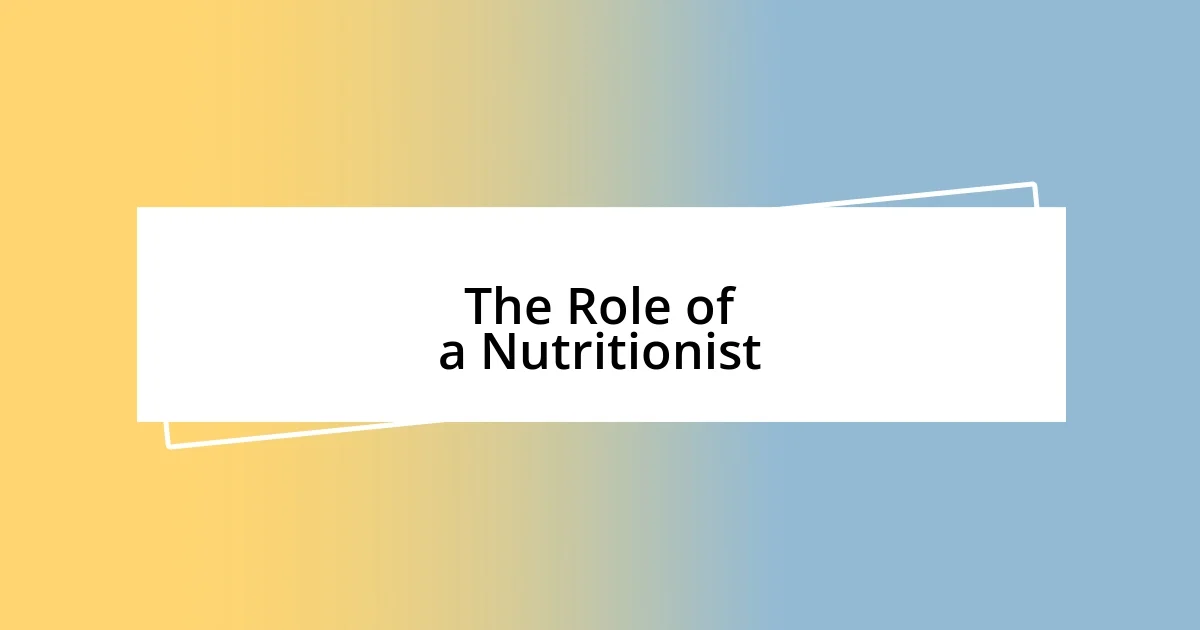
The Role of a Nutritionist
The role of a nutritionist goes far beyond just structuring meal plans; they serve as guides, educators, and, often, a source of motivation on our nutritional journey. I can distinctly recall a moment when my nutritionist introduced me to the concept of intuitive eating. She emphasized that it’s not just about choosing the right foods, but listening to my body’s cues—whether I was genuinely hungry or just eating out of routine. That shift in perspective felt like a revelation.
- Nutritionists assess individual needs through comprehensive evaluations.
- They provide personalized guidelines that align with lifestyle and health goals.
- They educate clients about the nutritional value of foods and how to make informed choices.
- They offer emotional support to navigate the psychological aspects of eating.
- They help set realistic and achievable goals, celebrating progress along the way.
One of the profound insights I gained was the power of accountability. During sessions, my nutritionist would check in on my progress or areas where I struggled. I vividly remember a week when I fell short of my goals. Instead of feeling defeated, she reframed it as a learning opportunity. She gently reminded me that setbacks are simply a part of the journey—a concept that resonates deeply with me even now. Just having someone who understands and supports you can make all the difference.
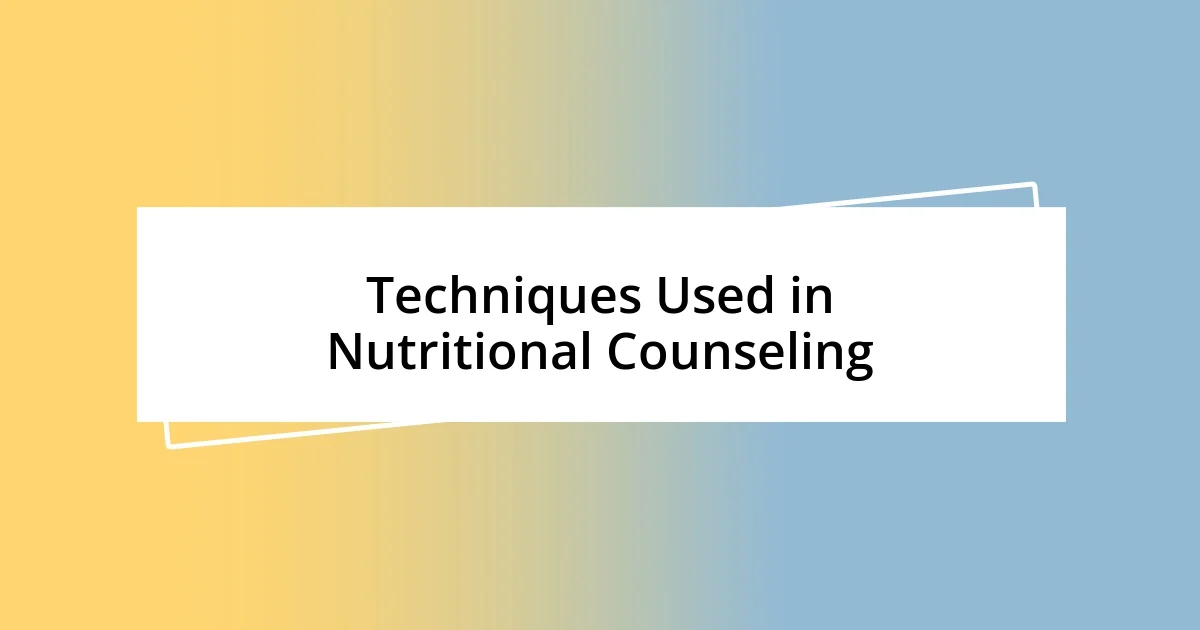
Techniques Used in Nutritional Counseling
One technique I found particularly effective in nutritional counseling is goal setting. My nutritionist encouraged me to define small, achievable goals rather than overwhelming myself with lofty aspirations. I remember feeling apprehensive at first, thinking, “Can I really commit to this?” But when I set the goal of trying one new healthy recipe each week, I was surprised by how much I enjoyed exploring new flavors and ingredients, which boosted my confidence.
Another important technique is mindfulness. In one session, my counselor introduced me to mindful eating practices. I found myself savoring bites of my meals instead of rushing through them. I recall a moment when I slowly enjoyed a piece of dark chocolate, fully experiencing its richness. This might sound simple, but it changed how I related to food. Have you ever paused to truly taste what you’re eating? It can transform a mundane snack into a delightful ritual.
Lastly, the use of journaling came into play as a technique that deepened my understanding of my eating patterns. I began to log not just what I ate but also how I felt before and after meals. One day, I uncovered a recurring theme: I often reached for snacks when I was bored rather than hungry. It was a revelation that made me curious about how I could fill my time differently. This simple practice became a powerful tool for self-discovery and change.
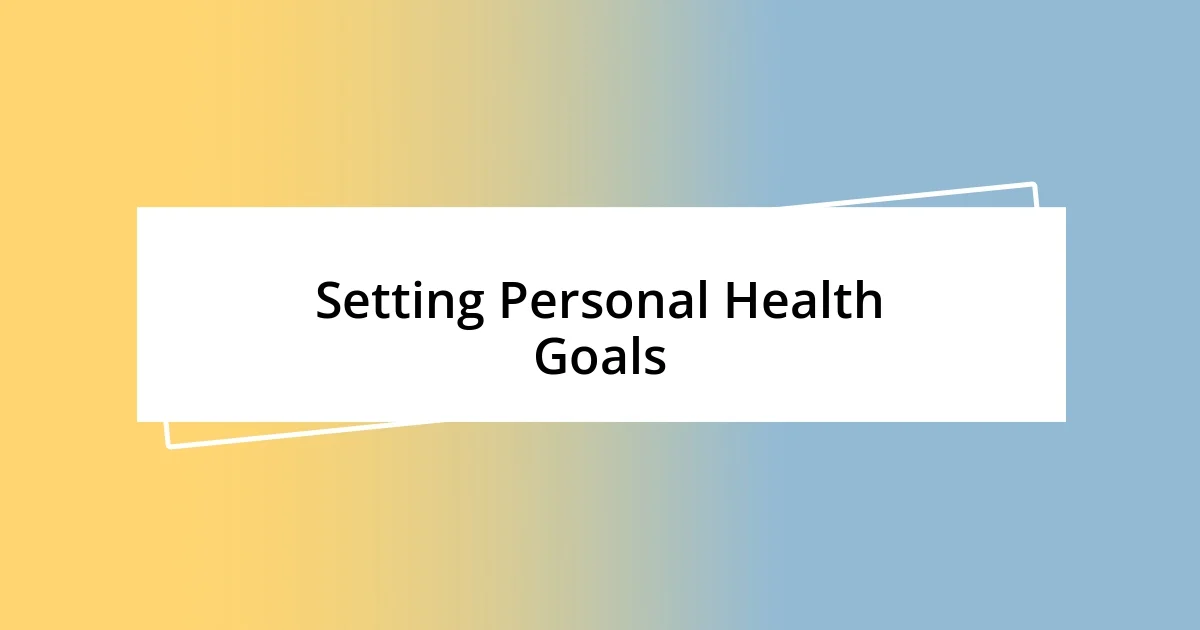
Setting Personal Health Goals
Setting personal health goals is really a transformative experience. When I started my journey, my nutritionist encouraged me to think deeply about what I truly wanted—beyond the surface level desires. I remember sitting there, a bit nervous, as we identified my motivations. Was it to feel more energetic, to fit into clothes I loved, or perhaps to inspire my family? Understanding my “why” made setting my goals not just a checklist, but a meaningful endeavor.
I also learned that specificity is key. Instead of saying, “I want to eat healthier,” I was guided to set goals like “I will include a serving of vegetables at lunch every day.” It felt tangible. I can still picture myself at the grocery store, deliberately choosing vibrant veggies and thinking, “This is part of my goal.” And let me tell you, seeing those colors on my plate lifted my spirit. It made the process feel less like a chore and more like an exciting challenge.
Emotional resilience surfaced later in my journey. There was one moment when I wanted to throw in the towel after a week full of indulgences. My nutritionist helped me see those moments as opportunities to learn rather than failures. “What did you enjoy most?” she asked, prompting me to reflect. I realized I often celebrated stress with sweets! That realization was freeing. It pushed me to set goals that not only involved food but also addressed emotional well-being—like practicing yoga or going for walks. Have you ever considered how your emotional state impacts your goals? This connection is vital for sustainable progress.
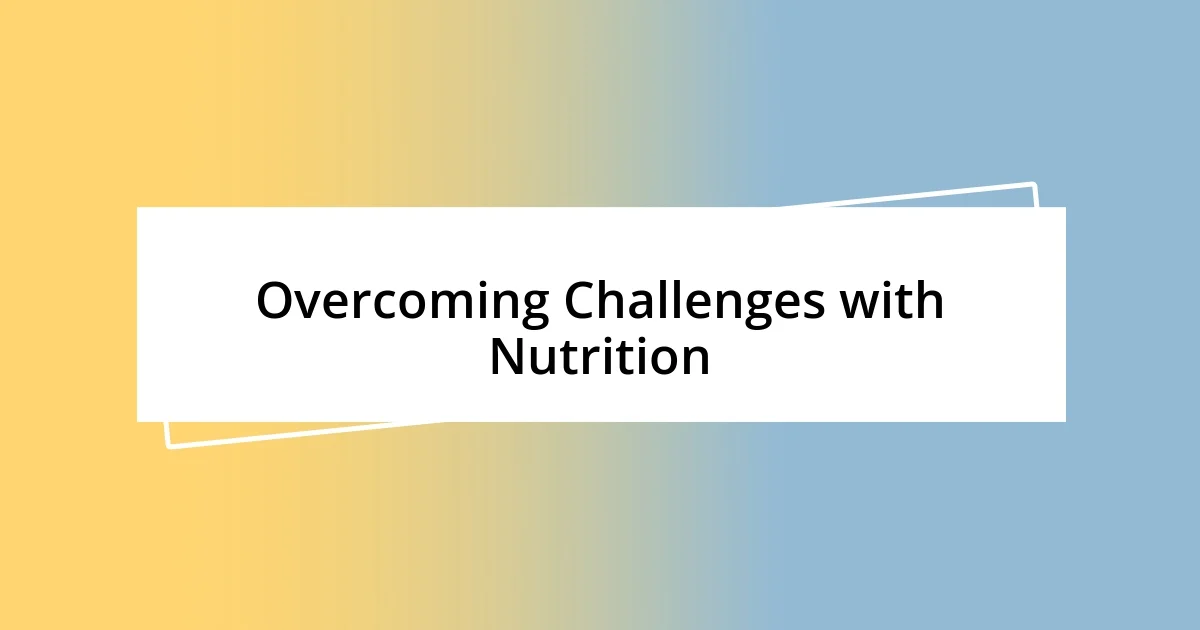
Overcoming Challenges with Nutrition
Overcoming challenges with nutrition can often feel daunting, but it’s a journey filled with opportunity. I remember the frustration of cravings leading me astray during a busy week. One day, I found myself stressed out and reaching for chips instead of the fresh fruit I had prepped. It hit me then that recognizing my emotional triggers was just as important as what I chose to eat. Have you ever had those moments where you just want to munch mindlessly? Acknowledging that was a game changer for me.
Another challenge I faced was navigating social situations. Dining out with friends often felt like a minefield of poor choices. I vividly recall a birthday dinner where the menu was loaded with rich dishes. Instead of feeling defeated, I opted for the grilled chicken salad and indulged in just a few fries to enjoy the moment without going overboard. It took practice, but I learned that making small, conscious choices didn’t mean sacrificing enjoyment. Have you ever found balance at a restaurant despite the temptations? That realization empowered me to embrace my choices and own them.
Sometimes, overcoming challenges also means reevaluating my environment. I’d often find myself backsliding into old habits, especially when snacks would beckon me from the pantry. With a little brainstorming, I swapped junk food for healthier options. I even created a little snack station with nuts and air-popped popcorn—fun fact, it became my go-to during movie nights instead of guzzling down sugary treats. Isn’t it incredible how a simple change in our surroundings can make healthier choices so much easier? That simple adjustment helped eliminate the guesswork and made me feel more in control of my nutrition.

Success Stories and Results
Success stories in my nutritional counseling journey have been profoundly impactful. There was a particular moment when I celebrated a milestone of losing ten pounds. I remember feeling a rush of joy and pride. It wasn’t just about the number on the scale; it represented my commitment to change and my newfound confidence in choosing better options at meals. Have you ever felt that exhilarating mix of accomplishment and motivation? It can be incredibly empowering.
As I continued to work with my nutritionist, another success came in the form of improved energy levels. I distinctly recall a day when I opted for a nutrient-dense breakfast instead of my usual carb-heavy routine. That afternoon, I breezed through my tasks, feeling alert and focused. It was a revelation! It made me realize how the right food choices could transform my entire day. Can you imagine feeling that kind of clarity regularly? It’s a game changer.
In another instance, I found success in sharing my journey with friends and family. After weeks of progress, I hosted a dinner and proudly prepared healthy dishes that even my skeptical relatives enjoyed. The joy of seeing them savor a quinoa salad made me reflect on how far I had come. I wondered, have you ever inspired someone just by living your truth? Those moments reinforced my belief in the power of sharing experiences, proving that success isn’t just personal; it can ripple out and encourage others.












